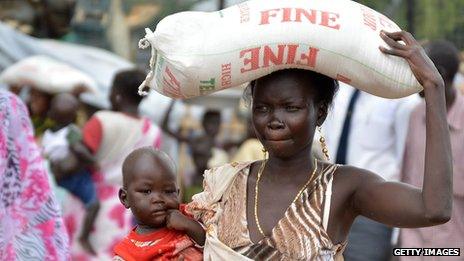South Sudan's foreign workers policy rattles investors
- Published

A foreign investor is reconsidering a project in South Sudan after the government flip-flopped on its policy towards foreign workers.
Phoenix Africa told the BBC developments in South Sudan are causing it to rethink one of its projects.
On Tuesday the government in Juba ordered all foreign workers to leave, but later reversed the decision.
Chief executive Paddy Docherty said the matter was "a serious concern for any potential investor in South Sudan".
"It raises real worries about future government attitudes to outside investment and, crucially, consistency in policy."
Phoenix Africa aims to invest in agricultural projects in fragile African states.
"We will now be thinking very hard about the likely stability of government policy on expats, as we could not possibly launch a business there without bringing in a number of senior people," Mr Docherty said.
"The country simply cannot develop without significant injections of foreign capital and expertise across all sectors, " he added.
Famine risk
Tens of thousands of skilled workers from neighbouring nations in East Africa, such as Ethiopia, Eritrea, Kenya, Sudan and Uganda are employed in key jobs, running South Sudan's mobile telephone network, banking sector, oil operations, hotels and other areas of infrastructure.
Aid agencies and the United Nations voiced their concern over a policy that would have resulted in the removal of Sudan's immigrant work force.
It comes as the United Nations is warning of a risk of famine and aid agencies insist they need foreign workers to help the country deal with the crisis.
The UN aid chief in South Sudan, Toby Lanzer, repeated its warning that only an end to the war and increasing aid efforts could avert the impending crisis.
"We are facing the very strong chance that famine would be declared by the end of this year or early 2015. You need to have all hands on deck, we need all the help we can get," he said.
International aid agencies contacted by the BBC admitted concern about South Sudan's policy towards foreign workers, but were unwilling to make an official statement, citing the fraught relationship with the government.
African neighbours frustrated
South Sudan's inconsistent policy towards foreign workers also threatens to undermine economic relations with other countries in the region.
François Conradie, an political analyst, with NKC Independent Economists told the BBC "one can distinguish a sense among East Africans that the South Sudanese are ungrateful for all that their neighbours have done to build up the country and if this kind of initiative re-emerges, as seems likely, then some effects may be seen at the level of East African integration."
Mr Conradie criticised the idea of replacing foreign workers.
"It makes the government look erratic and unpredictable, and inevitably makes South Sudan look less attractive as an investment destination," he told the BBC.
It's widely accepted that South Sudan's economy needs foreign expertise, because the country suffers from a major shortage of skilled workers.
Trade ties with growing economies like Ethiopia and Kenya are also vital.
Alex de Waal, executive director of the World Peace Foundation, is very familiar with efforts to build South Sudan's economy after visiting the region for 30 years.
He told the BBC "the neighbours, Ethiopia, Kenya, Uganda, all of which have their own political and economic risks in South Sudan have been clearly frustrated, both by the government and the opposition and this decision will not have encouraged them," he said.
Investors rattled
Last month the US energy giant Exxon Mobil revealed that it was withdrawing from South Sudan, a setback to an economy which is dependent on oil. Industry insiders recognised Exxon's concern about continuing political uncertainty.
The US oil giant's exit leaves China as the biggest investor in the nation's energy sector, at a time when Chinese troops, deployed by the United Nations, are being sent to guard the oilfields.
The United States has imposed sanctions on two military officers on opposite sides of the ethnic violence in South Sudan, in a demonstration of American frustration that fighting has continued despite two ceasefires.
Thousands have been killed and more than a million have fled their homes since December and still there is no sign of agreement between the political rivals, President Salva Kiir and the deputy he fired, Riek Machar.
- Published17 September 2014
- Published18 April 2023
- Published9 September 2014